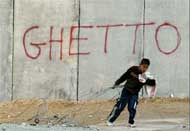
As the International Court of Justice in The Hague prepares to hear arguments regarding the legality of Israel’s Separation Wall, it is difficult to discern just how annoyed and concerned Israel is about having to defend its indefensible fence. While Israel has miraculously refrained from boycotting the International Court of Justice, it has already decided to submit arguments both in writing and orally that undermine the legitimacy of the World Court to hold hearings on the Separation Wall.
Typically, Israel tends to arrogantly challenge the authority of any international body that seeks to probe its actions. For example, Israel challenged the right of the United Nations Human Rights Commission in July, 2003, to investigate Israeli human rights abuses in the occupied territories. Prime Minister Ariel Sharon, speaking in closed cabinet meeting on Sunday, said that if the route of the Wall was changes it will not be in response to demands by the Palestinians, the United Nations or the International Court of Justice.
Yet, despite the norm of defying the international community, Israel seems to be feeling the pressure the fence has brought to bear. According to the Sharon government’s prepared submission to the Israeli High Court of Justice, which is currently also preparing to respond to several petitions against the Wall, Israel will examine already constructed portions of the Separation Wall and is willing to consider changing the route of portions that have not yet been built.
Sharon on Monday told lawmakers that he asked governmental committees to review the Wall adding that the barrier was "unsatisfactory in the harm it does to Palestinians' daily lives." While it would be nice to believe that Palestinian well being was a sincere concern for Sharon, it is more likely that he was mindful of his acting Attorney General Edan Arbel, who opined that she would have trouble defending portions of the Wall’s route to the Israeli High Court. The same sentiments were echoed by Israeli legal authorities concerned with the World Court hearings, which forced Sharon to admit there could be "legal difficulties in defending the state's position."
A senior Israeli official, speaking on condition of anonymity, has commented that "there will definitely be changes, but they will be cosmetic changes, tactical changes," adding that ways to make movement easier for Palestinians were being developed, including plans for bridges or tunnels to connect Palestinian cities completely encircled by the Wall with the rest of the West Bank. This seems directly in line with Sharon’s vision of a Palestinian state composed of enclaves connected by underground tunnels under Israeli control.
The 440-mile Apartheid Wall has always been Sharon’s plan for resolving the conflict. Whatever the answer the World Court arrives at, in what is likely to be a prolonged hearing that might take years, two things remain clear: Israel is adamant in building the Separation Wall and nothing short of divine intervention will stop them, and the Palestinians will emerge as not only an occupied people, but an imprisoned people.







